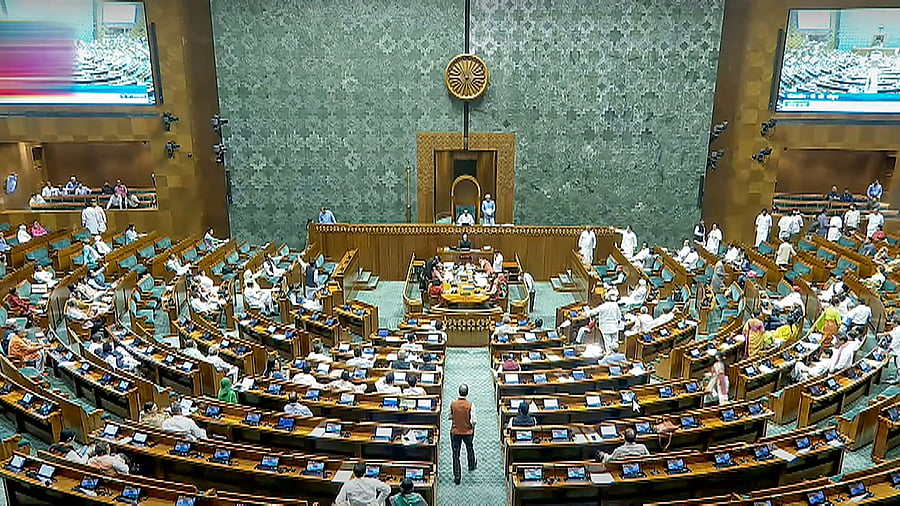
Members in the Lok Sabha in the Parliament, in New Delhi.
Credit: PTI File Photo
On March 11, the government tabled the Immigration and Foreigners Bill, 2025, before the Lok Sabha. According to the government, the bill aims to strengthen State sovereignty and authority over immigration, foreigners, and national borders while also improving and refining India's immigration framework. However, the bill ignores a fundamental issue—the lack of a formal mechanism for refugee protection and management. The absence of a legal framework for addressing the refugee issue presents international challenges and domestic convenience to the government.
The current position of law provides the government a great degree of freedom and flexibility in deciding how to treat refugees in India, while moral clarity and diplomatic coherence are sacrificed in the process.
India's stance on the refugee issue is consistent with what Professor B S Chimni of O P Jindal Global University in Sonipat refers to as "strategic ambiguity", where the government provides refuge to displaced people but does not formally commit to the 1951 Refugee Convention. This pragmatic and selective strategy helps India deal with regional issues but frequently leaves refugees unsure of their status and protection. Further, the non-refoulement principle, which prohibits sending refugees back to the place where they are facing persecution, is recognised by the Government of India in practice. However, a lack of statutory law or commitment to the
Refugee Convention makes protection and safeguard discretionary rather than mandatory. India's case-to-case approach to refugee protection is motivated by historical foundations, economic considerations, political dynamics, and security concerns. For instance, the Tibetan and Sri Lankan Tamil exiles have had a smoother and more stable pathway, while groups such as the Rohingya have faced severe resistance.
Without making an explicit legal commitment to international refugee law, the bill strengthens India's immigration control. Section 3 of the bill prohibits entry of any foreigner into India without valid documents. The law vests the final decision on the immigration officer, the executive, to decide lawful entry into India. While it is reasonable to prohibit the illegal entry of persons, in the absence of any provision for refugee protection, the provision could potentially be enforced indiscriminately without distinguishing between a refugee and other illegal immigrants.
Further, the bill requires the foreigner to prove that they have not entered India illegally. An inevitable procedural challenge for refugees, who often cross borders without adequate paperwork. Section 29 of the Bill also reinforces India’s claim of sovereignty over its national borders by empowering the State to deport foreigners without specifically making any provision for refugees, considering that they are often escaping persecution.
While the Indian government might argue that they have not committed to the refoulement clause in the Refugee Convention that prohibits States from sending back refugees to places where they might face persecution, non-refoulement is still a principle of international customary law that binds States, nevertheless.
As mentioned previously, the stance of the government arises out of various interests, but without clear legal guarantees or framework, these vulnerable groups of people remain at the mercy of dwindling political calculations and negotiations.
This issue is not just limited to the border but also how the police and other law enforcement agencies deal with refugees who are living in various parts of the country.
The selective approach of the government essentially turns a blind eye to the existence of refugees. The absence of a legal framework to recognise these people as refugees results in police raids, illegal detention, corruption and other forms of harassment. Unpredictability, inconsistency, and lack of accountability become the governing norm.
The Immigration and Foreigners Bill of 2025 does not resolve the refugee question, nor does it claim to do so. However, it bears repetition that India protects its refugees effectively, relative to other countries.
The bill reaffirms the Indian government’s policy of addressing the refugee question domestically without external interference. But is sovereignty enough on its own? Can a country that upholds humanitarian principles afford to let politics decide how to handle refugee protections? India has adopted a strategy that prioritises adaptability and flexibility over certainty and commitment.
These questions are of significance given India’s global aspiration of becoming a world leader on multiple international fronts, one of them being international human rights protection. Consistency, credibility, coherence and commitment are signs of a stable democracy and reliable ally – much-needed traits for Pax Indica.
(The writer is an assistant professor at the Alliance School of Law, Alliance University; views are personal)